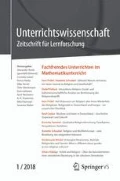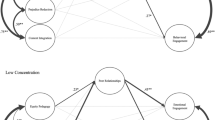Abstract
In a part of the video study “Argumentative teaching-learning processes” in civic education classrooms, students’ participation in controversial political classroom discussions is described and related to personality traits and communicative dispositions. Besides person-related variables, effects of assigned positions for in-class discussion on participation were investigated. Based on research from educational psychology, civic education and the political sciences, it was assumed that the tendency to approach or avoid arguments such as in political discussions is meaningfully affected by five-factor personality traits and epistemological beliefs. Regression and path analyses were conducted on a sample of nine civic education classes at the eighth and ninth grades (N = 221 students) in North Rhine-Westphalia. Results primarily confirmed expectations and revealed that participation in controversial classroom discussions, but not in teacher-led classroom talk, was clearly associated with relatively stable personality traits and dispositions. Students that had to argue a position divergent to their personal view on the controversy were less likely to take part in the discussion. These findings have practical implications for instructors.
Zusammenfassung
In dieser Teilauswertung der Videostudie „Argumentative Lehr-Lern-Prozesse“ im Fachunterricht Politik/Wirtschaft wird die mündliche Beteiligung von Schüler/-innen an kontroversen Unterrichtsdiskussionen beschrieben und mit Persönlichkeitsmerkmalen und kommunikativen Dispositionen in Verbindung gesetzt. Neben personenbezogenen Merkmalen wird der Einfluss von zugewiesenen Diskussionspositionen auf die Beteiligung untersucht. Auf Basis lehr-lernpsychologischer, politikwissenschaftlicher und politikdidaktischer Forschungsarbeiten wurde angenommen, dass die Tendenz Argumentationen aufzusuchen oder zu vermeiden (zum Beispiel im Rahmen politischer Diskussionen) von Persönlichkeitsmerkmalen und epistemologischen Überzeugungen beeinflusst wird. Die Stichprobe besteht aus neun Schulklassen der Jahrgänge acht und neun (N = 221) an Gymnasien in Nordrhein-Westfalen. Die Ergebnisse der Regressions- und Pfadanalysen sind im Wesentlichen erwartungskonform. Sie zeigen, dass die Teilhabe an kontroversen Diskussionen, nicht jedoch am fragend-entwickelnden Unterricht, stark von relativ stabilen Persönlichkeitsmerkmalen und Dispositionen abhängt. Schüler/-innen, denen eine zur persönlichen Position konträre Diskussionsposition zugewiesen wurde, beteiligten sich mit einer geringeren Wahrscheinlichkeit an den Diskussionen als Schüler/-innen, die ihre eigene Position vertreten durften. Dies birgt unterrichtspraktische Implikationen.

Similar content being viewed by others
Notes
Because of technical problems, the matching of questionnaire and video data was not possible in one of the ten classes of the video study.
References
Abs, H. J. (2013). Die Vermessung des guten Bürgers – Zur empirischen (De-)konstruktion eines Ideals. Zeitschrift für Soziologie der Erziehung und Sozialisation (ZSE), 33, 267–282.
Asterhan, C. S. C., & Schwarz, B. B. (2016). Argumentation for learning: well-trodden paths and unexplored territories. Educational Psychologist, 51, 164–187. https://doi.org/10.1080/00461520.2016.1155458.
Blickle, G. (1997). Argumentativeness and the facets of the big five. Psychological Reports, 81, 1379–1385. https://doi.org/10.2466/pr0.1997.81.3f.1379.
Detjen, J., Massing, P., Richter, D., & Weißeno, G. (2012). Politikkompetenz – ein Modell. Wiesbaden: Springer VS.
Festinger, L. (1957). A theory of cognitive dissonance. Stanford: Stanford University Press.
Gerber, A. S., Huber, G. A., Doherty, D., Dowling, C. M., Raso, C., & Ha, S. E. (2011). Personality traits and participation in political processes. The Journal of Politics, 73, 692–706. https://doi.org/10.1017/s0022381611000399.
Gerber, A. S., Huber, G. A., Doherty, D., & Dowling, C. M. (2012). Disagreement and the avoidance of political discussion: aggregate relationships and differences across personality traits. American Journal of Political Science, 56, 849–874. https://doi.org/10.1111/j.1540-5907.2011.00571.x.
Gronostay, D. (2017). Enhancing the quality of controversial discussions via argumentation training: a quasi-experimental study in civic education classrooms. Bildung und Erziehung, 70, 75–90. https://doi.org/10.7788/bue-2017-0107.
Gronostay, D., Neumann, D., & Manzel, S. (2015). Videographie in der politikdidaktischen Forschung – Reichweiten und Grenzen anhand aktueller Forschungsprojekte. In A. Petrik (Ed.), Formate fachdidaktischer Forschung in der politischen Bildung. Schwalbach am Taunus: Wochenschau.
Gronostay, D., & Manzel, S. (2018). Videografie. In C. Wagemann, A. Goerres & M. Siewert (Eds.), Handbuch Methoden der Politikwissenschaft (Springer Reference Sozialwissenschaften). Wiesbaden: Springer VS. https://doi.org/10.1007/978-3-658-16937-4.
Helmke, A. (2015). Unterrichtsqualität und Lehrerprofessionalität. Diagnose, Evaluation und Verbesserung des Unterrichts (6th edn.). Seelze-Velber: Klett.
Hibbing, M. V., Ritchie, M., & Anderson, M. R. (2011). Personality and political discussion. Political Behavior, 33, 601–624. https://doi.org/10.1007/s11109-010-9147-4.
Hofer, B. K., & Pintrich, P. R. (1997). The development of epistemological theories: beliefs about knowledge and knowing and their relation to learning. Review of Educational Research, 67, 88–140. https://doi.org/10.2307/1170620.
Infante, D. A. (1981). Trait argumentativeness as a predictor of communicative behavior in situations requiring argument. Central States Speech Journal, 32, 265–272. https://doi.org/10.1080/10510978109368105.
Infante, D. A., & Rancer, A. S. (1982). A conceptualization and measure of argumentativeness. Journal of Personality Assessment, 46, 72–80. https://doi.org/10.1207/s15327752jpa4601_13.
Johnson, D. W., & Johnson, R. T. (2009). Energizing learning: the instructional power of conflict. Educational Researcher, 38, 37–51. https://doi.org/10.3102/0013189X08330540.
King, P. M., & Kitchener, K. S. (1994). Developing reflective judgement: understanding and promoting intellectual growth and critical thinking in adolescents and adults. San Francisco: Jossey-Bass.
Kovalainen, M., & Kumpulainen, K. (2007). The social construction of participation in an elementary classroom community. International Journal of Educational Research, 46(3–4), 141–158. https://doi.org/10.1016/j.ijer.2007.09.011.
Krettenauer, T. (2005). Die Erfassung des Entwicklungsniveaus epistemologischer Überzeugungen und das Problem der Übertragbarkeit von Interviewverfahren in standardisierte Fragebogenmethoden. Zeitschrift für Entwicklungspsychologie und Pädagogische Psychologie, 37, 69–79. https://doi.org/10.1026/0049-8637.37.2.69.
Kuhn, D. (1999). A developmental model of critical thinking. Educational Researcher, 28, 16–46. https://doi.org/10.3102/0013189X028002016.
Kuhn, D., & Udell, W. (2007). Coordinating own and other perspectives in argument. Thinking & Reasoning, 13, 90–104. https://doi.org/10.1080/13546780600625447.
Kuhn, D., Cheney, R., & Weinstock, M. (2000). The development of epistemological understanding. Cognitive Development, 15, 309–328. https://doi.org/10.1016/S0885-2014(00)00030-7.
Lipowsky, F., Rakoczy, K., Pauli, C., Reusser, K., & Klieme, E. (2007). Gleicher Unterricht – gleiche Chancen für alle? Die Verteilung von Schülerbeiträgen im Klassenunterricht. Unterrichtswissenschaft, 35, 125–147.
Manzel, S. (2017). Erfüllt das Kontroversitätsprinzip Merkmale einer politikdidaktischen Theorie? In M. Oberle & G. Weißeno (Eds.), Politikwissenschaft und Politikdidaktik. Theorie und Empirie (pp. 31–44). Wiesbaden: Springer VS.
Mason, L., & Scirica, F. (2006). Prediction of students’ argumentation skills about controversial topics by epistemological understanding. Learning and Instruction, 16, 492–509. https://doi.org/10.1016/j.learninstruc.2006.09.007.
McCrae, R. R., & Costa, P. T. (1995). Trait explanations in personality psychology. European Journal of Personality, 9, 231–252. https://doi.org/10.1002/per.2410090402.
McCrae, R. R., & John, O. P. (1992). An introduction to the five-factor model and its applications. Journal of Personality, 60, 175–215. https://doi.org/10.1111/j.1467-6494.1992.tb00970.x.
McKee, R. J. (2015). Encouraging classroom discussion. Journal of Social Science Education, 14(1), 66–73. https://doi.org/10.4119/UNIBI/jsse-v14-i1-1303.
Mondak, J. J., & Halperin, K. D. (2008). A framework for the study of personality and political behaviour. British Journal of Political Science, 38, 335–362. https://doi.org/10.1017/S0007123408000173.
Mondak, J. J., Hibbing, M. V., Canache, D., Seligson, M. A., & Anderson, M. R. (2010). Personality and civic engagement: an integrative framework for the study of trait effects on political behavior. American Political Science Review, 104, 85–110. https://doi.org/10.1017/S0003055409990359.
Muthén, L. K., & Muthén, B. O. (2012). Mplus user’ guide (7th edn.). Los Angeles: Muthén & Muthén.
Nielsen, J. A. (2013). Delusions about evidence: on why scientific evidence should not be the main concern in socioscientific decision making. Canadian Journal of Science, Mathematics and Technology Education, 13(4), 373–385. https://doi.org/10.1080/14926156.2013.845323.
Nussbaum, E. M., & Bendixen, L. D. (2003). Approaching and avoiding arguments: the role of epistemological beliefs, need for cognition, and extraverted personality traits. Contemporary Educational Psychology, 28, 573–595. https://doi.org/10.1016/S0361-476X(02)00062-0.
Rammstedt, B., & John, O. P. (2005). Kurzversion des Big Five Inventory (BFI-K): Entwicklung und Validierung eines ökonomischen Inventars zur Erfassung der fünf Faktoren der Persönlichkeit. Diagnostica, 51, 195–206. https://doi.org/10.1026/0012-1924.51.4.195.
Reinhardt, S. (2009). Schulleben und Unterricht – nur der Zusammenhang bildet politisch und demokratisch. Zeitschrift für Pädagogik, 55, 860–871.
Rocca, K. A. (2010). Student participation in the college classroom. An extended multidisciplinary literature review. Communication Education, 59, 185–213. https://doi.org/10.1080/03634520903505936.
Sacher, W. (1995). Meldungen und Aufrufe im Unterrichtsgespräch. Theoretische Grundlagen, Forschungsergebnisse, Trainingselemente und Diagnoseverfahren. Augsburg: Wissner.
Sedlacek, M., & Sedova, K. (2017). How many are talking? The role of collectivity in dialogic teaching. International Journal of Educational Research, 85, 99–108. https://doi.org/10.1016/j.ijer.2017.07.001.
Seidel, T. (2014). Angebots-Nutzungs-Modelle in der Unterrichtspsychologie. Integration von Struktur- und Prozessparadigma. Zeitschrift für Pädagogik, 60, 850–866.
Seidel, T., Prenzel, M., & Kobarg, M. (2005). How to run a video study. Technical report of the IPN Video Study. Münster: Waxmann.
Steinbrecher, M., & Schoen, H. (2012). Persönlichkeit und politische Partizipation im Umfeld der Bundestagswahl 2009. Politische Psychologie, 2(1), 58–74.
Vygotsky, L. S. (1978). Mind in society. The development of higher psychological processes. Cambridge: Harvard University Press.
Weißeno, G. (2017). Politikdidaktische Theoriebildung – eine wissenschaftstheoretische Orientierung. In M. Oberle & G. Weißeno (Eds.), Politikwissenschaft und Politikdidaktik. Theorie und Empirie (pp. 1–16). Wiesbaden: Springer VS.
Acknowledgements
The author wishes to thank the anonymous reviewers and the editor for their helpful comments on an earlier version of this manuscript.
Author information
Authors and Affiliations
Corresponding author
Rights and permissions
About this article
Cite this article
Gronostay, D. To argue or not to argue? The role of personality traits, argumentativeness, epistemological beliefs and assigned positions for students’ participation in controversial political classroom discussions. Unterrichtswiss 47, 117–135 (2019). https://doi.org/10.1007/s42010-018-00033-4
Published:
Issue Date:
DOI: https://doi.org/10.1007/s42010-018-00033-4




